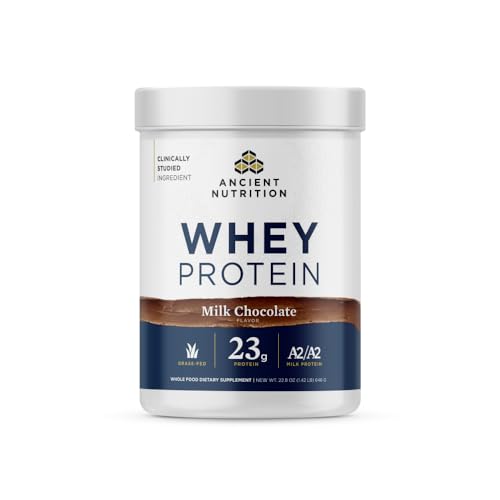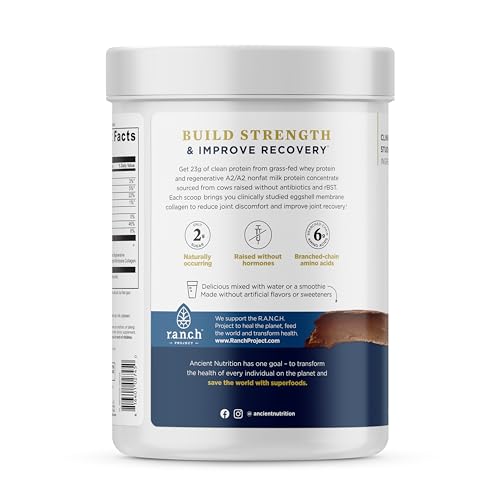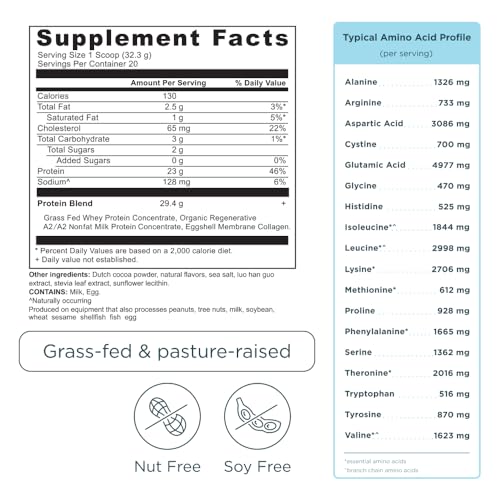



Ancient Nutrition Whey Protein Powder - 23g Protein, Easy Digest A2/A2 Milk, 20 Servings


Lecithin
Medium RiskLecithin is a naturally occurring lipid found in various plant and animal tissues, primarily composed of phospholipids. It serves as an emulsifier, stabilizing mixtures of oil and water, and is commonly used in food, cosmetics, and pharmaceuticals to improve texture and extend shelf life.
Sustai Insights
Lecithin provides functional benefits as an effective emulsifier and stabilizer, enhancing product texture while being sustainably sourced from natural origins. Health risks are generally low, with moderate concerns regarding allergies and immunotoxicity but minimal cancer or reproductive toxicity risks. Environmental hazards are limited, and it is not classified as a pollutant. Regulatory bodies impose few restrictions. Overall, lecithin presents a medium risk, suggesting caution in usage, especially for sensitive individuals. Alternatives include sunflower lecithin or other plant-based emulsifiers that may offer similar benefits with reduced allergenic potential.
Collagen
Low RiskCollagen is a protein found in cartilage and other connective tissues in the body. It plays a crucial role in providing structural support and elasticity, making it a key ingredient in various cosmetic and health products aimed at skin, hair, nails, and joint health.
Sustai Insights
Collagen serves as an effective structural protein, enhancing skin elasticity and hydration. It is generally recognized as safe, with low concerns regarding carcinogenicity, allergies, and reproductive toxicity. Environmental risks are minimal, and it is not bioaccumulative. Regulatory bodies impose few restrictions. Overall, collagen is assessed as low risk, but users should follow recommended usage guidelines. For those seeking alternatives, plant-based proteins may offer suitable options.
Milk
Low RiskMilk is whole milk from cows, primarily used as a source of nutrition and an ingredient in various food products. It contains proteins, fats, carbohydrates, vitamins, and minerals, contributing to its functional benefits in culinary applications.
Sustai Insights
Milk provides essential nutrients and serves as a versatile ingredient in food, enhancing flavor, texture, and nutritional value. It is generally regarded as safe with low concerns for carcinogenicity, allergies, or developmental toxicity. Environmental risks are minimal, and regulatory bodies impose no significant warnings. However, individuals with lactose intolerance or dairy allergies should exercise caution. Overall, milk is assessed as low risk based on current scientific consensus.
Protein
Low RiskProtein is a macromolecule composed of amino acids, serving various functions such as structural support, transport, and catalysis within biological systems. It is commonly used in food products and dietary supplements for its role in muscle repair, growth, and overall health.
Sustai Insights
Protein is essential for various biological functions, including muscle repair and growth, making it a valuable ingredient in food and supplements. It is generally considered safe, with low concerns for carcinogenicity, allergies, and developmental toxicity. However, it is important to source protein sustainably to minimize environmental impact. Regulatory bodies do not currently impose restrictions on protein use, indicating a low risk level overall. Safe usage practices include moderation in consumption, and alternatives such as plant-based proteins may be considered for sustainability.
Sea Salt
Low RiskSea salt is a mixture of inorganic salts derived primarily from the evaporation of seawater. It consists mainly of sodium chloride, with minor amounts of other minerals. Sea salt is commonly used as a seasoning and preservative in food products and may also have applications in cosmetics and personal care items.
Sustai Insights
Sea salt serves as an effective flavor enhancer and preservative, contributing to the taste and shelf-life of food products. It is generally considered safe with low risk for health concerns such as cancer, allergies, and reproductive toxicity. Environmental impact is minimal, as it does not contribute significantly to pollution or bioaccumulation. Regulatory bodies, including the FDA, currently do not impose restrictions on its use. Overall, the risk level associated with sea salt is low, making it a widely accepted ingredient with no significant adverse effects reported.
Collagen
Low RiskCollagen is a protein found in cartilage and other connective tissues in the body. It plays a crucial role in providing structural support and elasticity, making it a key ingredient in various cosmetic and health products aimed at skin, hair, nails, and joint health.
Sustai Insights
Collagen serves as an effective structural protein, enhancing skin elasticity and hydration. It is generally recognized as safe, with low concerns regarding carcinogenicity, allergies, and reproductive toxicity. Environmental risks are minimal, and it is not bioaccumulative. Regulatory bodies impose few restrictions. Overall, collagen is assessed as low risk, but users should follow recommended usage guidelines. For those seeking alternatives, plant-based proteins may offer suitable options.
Milk
Low RiskMilk is whole milk from cows, primarily used as a source of nutrition and an ingredient in various food products. It contains proteins, fats, carbohydrates, vitamins, and minerals, contributing to its functional benefits in culinary applications.
Sustai Insights
Milk provides essential nutrients and serves as a versatile ingredient in food, enhancing flavor, texture, and nutritional value. It is generally regarded as safe with low concerns for carcinogenicity, allergies, or developmental toxicity. Environmental risks are minimal, and regulatory bodies impose no significant warnings. However, individuals with lactose intolerance or dairy allergies should exercise caution. Overall, milk is assessed as low risk based on current scientific consensus.
Lecithin
Medium RiskLecithin is a naturally occurring lipid found in various plant and animal tissues, primarily composed of phospholipids. It serves as an emulsifier, stabilizing mixtures of oil and water, and is commonly used in food, cosmetics, and pharmaceuticals to improve texture and extend shelf life.
Sustai Insights
Lecithin provides functional benefits as an effective emulsifier and stabilizer, enhancing product texture while being sustainably sourced from natural origins. Health risks are generally low, with moderate concerns regarding allergies and immunotoxicity but minimal cancer or reproductive toxicity risks. Environmental hazards are limited, and it is not classified as a pollutant. Regulatory bodies impose few restrictions. Overall, lecithin presents a medium risk, suggesting caution in usage, especially for sensitive individuals. Alternatives include sunflower lecithin or other plant-based emulsifiers that may offer similar benefits with reduced allergenic potential.
Protein
Low RiskProtein is a macromolecule composed of amino acids, serving various functions such as structural support, transport, and catalysis within biological systems. It is commonly used in food products and dietary supplements for its role in muscle repair, growth, and overall health.
Sustai Insights
Protein is essential for various biological functions, including muscle repair and growth, making it a valuable ingredient in food and supplements. It is generally considered safe, with low concerns for carcinogenicity, allergies, and developmental toxicity. However, it is important to source protein sustainably to minimize environmental impact. Regulatory bodies do not currently impose restrictions on protein use, indicating a low risk level overall. Safe usage practices include moderation in consumption, and alternatives such as plant-based proteins may be considered for sustainability.
Sea Salt
Low RiskSea salt is a mixture of inorganic salts derived primarily from the evaporation of seawater. It consists mainly of sodium chloride, with minor amounts of other minerals. Sea salt is commonly used as a seasoning and preservative in food products and may also have applications in cosmetics and personal care items.
Sustai Insights
Sea salt serves as an effective flavor enhancer and preservative, contributing to the taste and shelf-life of food products. It is generally considered safe with low risk for health concerns such as cancer, allergies, and reproductive toxicity. Environmental impact is minimal, as it does not contribute significantly to pollution or bioaccumulation. Regulatory bodies, including the FDA, currently do not impose restrictions on its use. Overall, the risk level associated with sea salt is low, making it a widely accepted ingredient with no significant adverse effects reported.
Discover the power of nutrition with Ancient Nutrition's Protein Powder, designed to meet your protein needs while supporting overall health. This blend addresses the demand for high-quality protein sources that are easy to digest and beneficial for joint health.
- Powerful Protein Blend: Each serving offers 23g of protein from grass-fed whey and A2/A2 milk.
- Easy on the Gut: Formulated with A2/A2 milk protein, ideal for sensitive stomachs.
- Joint Support: Enriched with eggshell membrane collagen for enhanced joint comfort.
- Delicious Flavors: Available in three tasty options, making protein intake enjoyable.
- Quality Assurance: Crafted in GMP-certified facilities and tested by third-party labs.
- Made in the U.S.A.: Proudly produced to ensure the highest standards of quality.
Subscribe & Save with Sustai
- Best Price Guarantee: Always enjoy the lowest prices on sustainable home essentials.
- No Surprises: We’ll notify you before shipping. No hidden fees, ever.
- You’re in Charge: Change, pause, or cancel your subscription anytime with ease.
- Eco-Friendly Deliveries: Our grouped shipments mean less packaging and lower emissions.
Join us on a sustainable journey. Special offers for a limited time! Prices and promotions may change.
Recommended Products
Discover the power of nutrition with Ancient Nutrition's Protein Powder, designed to meet your protein needs while supporting overall health. This blend addresses the demand for high-quality protein sources that are easy to digest and beneficial for joint health.
- Powerful Protein Blend: Each serving offers 23g of protein from grass-fed whey and A2/A2 milk.
- Easy on the Gut: Formulated with A2/A2 milk protein, ideal for sensitive stomachs.
- Joint Support: Enriched with eggshell membrane collagen for enhanced joint comfort.
- Delicious Flavors: Available in three tasty options, making protein intake enjoyable.
- Quality Assurance: Crafted in GMP-certified facilities and tested by third-party labs.
- Made in the U.S.A.: Proudly produced to ensure the highest standards of quality.

You can have at most 2 Sustainable Steals products in your cart
Customer Reviews
Customers’ View
Customers generally appreciate the quality and taste of the Whey Protein Powder, noting its smooth texture and mild chocolate flavor that avoids excessive sweetness. Many users highlight the use of grass-fed whey and A2/A2 milk protein, which they believe contribute to both its digestibility and nutrient quality. The inclusion of eggshell membrane collagen for joint support is also a valued feature among health-conscious consumers. While some find the price a bit high, they express a commitment to investing in nutritious products that align with their wellness goals. Overall, this protein powder is recognized for its clean ingredients and effective formulation, making it a favorable choice for those seeking a health-oriented supplement.
AI-generated from the text of customer reviewsThis product has no reviews yet.




